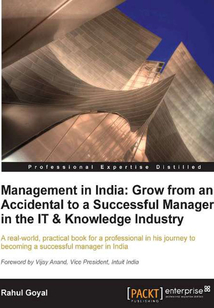首頁 > 社會科學 >
社會科學總論
> Management in India:Grow from an Accidental to a successful manager in the IT & knowledge industry最新章節目錄
舉報 

會員
Management in India:Grow from an Accidental to a successful manager in the IT & knowledge industry
最新章節:
Index
Thisbookfocusesonthereal-worldunderstandingofmanagementconceptssoastomaximizelearning.Itfocusesonthevariousaspectsofmanagementcoveringthecommonpitfallsandpracticalinsights.AlthoughitexplainsmanagementframeworksusinganIndiancontextandscenarios,thesemanagementprinciplesremainthesameacrossallsectorsandsopeoplefromothersectorswillalsobenefitfromthisbook.MNCswhowanttoeffectivelymanageemployeesoftheirIndianbranches,NewManagers,Aspiringmanagers,andsoon-to-bemanagers,AllmanagerswhowishtobemoreeffectivebybetterunderstandingthemanagementframeworksandhowtheyapplytotheIndianITandITessectors–ITProductDevelopment,Services,Backendprocessing,andBPO,Managementprinciplesremainthesameacrossallsectorsandsopeoplefromothersectorswillalsobenefitfromthisbook
目錄(114章)
倒序
- coverpage
- Management in India: Grow from an Accidental to a Successful Manager in the IT & Knowledge Industry
- Credits
- Foreword
- About the Author
- Acknowledgement
- About the Reviewers
- www.PacktPub.com
- Support files eBooks discount offers and more
- Preface
- What this book covers
- Who this book is for
- Conventions
- Reader feedback
- Customer support
- Chapter 1. Whose Side Are You On?
- What is a manager supposed to manage?
- The mai-baap manager
- Visualizing the managerial model
- Some questions answered
- Summary
- References
- Chapter 2. Transition: From Individual Contributor to a Manager
- Watch out for
- Time
- Frustrations of being a new manager
- Making it easier
- Summary
- References
- Chapter 3. Basic Skills Traits and Competencies of a Manager
- Skills traits talents and competencies
- Top skills traits and competencies expected of a manager
- Emotional intelligence
- Summary
- References
- Chapter 4. Teamwork and Team Building
- Why do we need teams?
- Different types of teams
- How to build a team
- Why teams fail
- Summary
- Chapter 5. Communicating
- Elements of good communication
- What managers must know about communication
- Scenarios
- Summary
- Chapter 6. Motivation
- Understanding motivation
- Motivation theories
- What's motivating in today's workplace?
- What is demotivating?
- Signs of low motivation
- Is money a motivator?
- Summary
- References
- Chapter 7. Hiring
- Understanding hiring
- How to conduct an effective interview
- Compensation
- Closing the hiring process
- Campus hiring
- Summary
- Chapter 8. Performance Evaluation
- Understanding performance
- Purpose of performance evaluation
- Performance evaluation process
- Using the bell curve in performance evaluation
- Problems with the performance appraisal process
- Performance management and appraisal as a two-stage system
- Summary
- Chapter 9. Attrition
- Understanding attrition
- Categories of 'quitters'
- Cost of attrition
- Benefits of attrition
- Attrition — watch out
- Managing attrition
- Summary
- Chapter 10. Managing — Remoteness Work-Life Gen Y and Diversity
- Managing remoteness
- Work-life balance
- Managing Indian Gen Y
- Managing diversity
- Summary
- Chapter 11. Effective Planning
- Why plan?
- Planning cycle
- A good project manager
- What to consider when creating a plan
- Nuances of planning in India
- Summary
- Chapter 12. How to Grow As a Manager
- What does 'growth' mean to you?
- Some dos to grow as a manager
- Some don'ts to grow as a manager
- Summary
- Chapter 13. Summing it Up
- Know what you manage
- Transition requires a mindset change
- Help yourself get help
- Know your success measures
- Managers wear multiple hats
- Manager as a conduit
- Team building — define playing positions
- Team building — winning as a team
- Communicate in a timely manner — reduce layers add clarity
- Motivation — Maslow's hierarchy of needs
- Hiring
- Attrition — expect it manage it
- Planning and execution
- Decision-making
- Manage — all aspects
- Summary
- Index 更新時間:2021-08-13 18:22:33
推薦閱讀
- 人杰地靈?!:論美國等國人才輩出及近代中國數學落后的原因
- 人才發展治理:國家治理現代化的重要基石
- 管理心理學:理論、應用與案例
- 成長的哲學課:自我與人生的思考
- 歷史個體與普遍歷史:邁向和而不同的比較歷史社會學
- 中國城市智慧低碳發展報告·2014
- “普世價值”評析(居安思危·世界社會主義小叢書)
- 電學領域審查實務(第二輯)
- 十年后工作圖鑒
- Enterprise Agility
- 專利信息分析實訓
- 非物質文化遺產保護領域社會力量研究
- 進化社會科學導論(現代社會學文庫(第2輯))
- 永不停歇的時鐘:機器、生命動能與現代科學的形成
- “一帶一路”沿線國家五通指數報告(2017)
- 夢溪筆談
- 西北人文科學評論(2016年)(第九卷)
- 臨危不亂,說到做到:黨員干部從政必備的決斷力修煉
- 惠農這十年
- 美國生活中的同化
- 2014年度寧波市社會科學優秀成果集
- 世界遺產視野下的“一帶一路”
- 中國“60后”作家訪談錄
- 國別和區域研究(第4卷/2019年第2期/總第8期)
- 社會發展:理論·評估·政策
- 年輕人要知道的2000個社會常識
- 當代中國治理轉型與社會組織發展
- 悅讀MOOK(第七卷)
- 政策文本計算:理論、方法與實證
- 北大公開課:北大才齋講堂精華集

